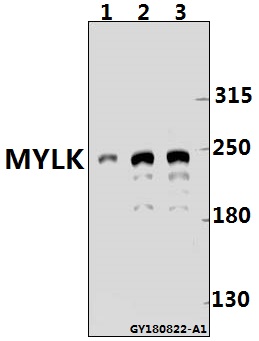Product Name :
MYLK polyclonal antibody Background :
The Ca2+/calmodulin-dependent protein kinases (CaM kinases) are a structurally related subfamily of serine/threonine kinases that includes CaMKI, CaMKII, CaMKIV and myosin light chain kinases (MYLK, also designated MLCK). The MYLK kinases phosphorylate myosin regulatory light chains to catalyze myosin interaction with actin filaments resulting in contractile activity. Non-muscle, smooth muscle and skeletal/cardiac muscle MYLK isoforms exist. The MYLK gene (also designated MYLK1) encodes both smooth muscle and non-muscle isoforms as well as telokin, a small C-terminal isoform expressed only in smooth muscle with the capacity to stabilize unphosphorylated myosin filaments. Multiple transcript variants are described for the MYLK gene. Smooth-muscle and non-muscle MYLK isoforms are expressed in a wide variety of adult and fetal tissues. The skeletal/cardiac muscle isoforms of MYLK are encoded by a separate gene, MYLK2 (also designated skMLCK). MYLK appears to be a target for PAKs (p21-activated kinases). PAK1 interaction with MYLK results in a decrease in MYLK activity and myosin light chain phosphorylation. Product :
Rabbit IgG, 1mg/ml in PBS with 0.02% sodium azide, 50% glycerol, pH7.2 Storage&Stability :
Store at 4°C short term. Aliquot and store at -20°C long term. Avoid freeze-thaw cycles. Specificity :
MYLK polyclonal antibody detects endogenous levels of MYLK protein. Immunogen :
Synthetic peptide, corresponding to amino acids 1750-1795 of Human MYLK. Conjugate :
Unconjugated Modification :
Unmodification
MYLK polyclonal antibody Background :
The Ca2+/calmodulin-dependent protein kinases (CaM kinases) are a structurally related subfamily of serine/threonine kinases that includes CaMKI, CaMKII, CaMKIV and myosin light chain kinases (MYLK, also designated MLCK). The MYLK kinases phosphorylate myosin regulatory light chains to catalyze myosin interaction with actin filaments resulting in contractile activity. Non-muscle, smooth muscle and skeletal/cardiac muscle MYLK isoforms exist. The MYLK gene (also designated MYLK1) encodes both smooth muscle and non-muscle isoforms as well as telokin, a small C-terminal isoform expressed only in smooth muscle with the capacity to stabilize unphosphorylated myosin filaments. Multiple transcript variants are described for the MYLK gene. Smooth-muscle and non-muscle MYLK isoforms are expressed in a wide variety of adult and fetal tissues. The skeletal/cardiac muscle isoforms of MYLK are encoded by a separate gene, MYLK2 (also designated skMLCK). MYLK appears to be a target for PAKs (p21-activated kinases). PAK1 interaction with MYLK results in a decrease in MYLK activity and myosin light chain phosphorylation. Product :
Rabbit IgG, 1mg/ml in PBS with 0.02% sodium azide, 50% glycerol, pH7.2 Storage&Stability :
Store at 4°C short term. Aliquot and store at -20°C long term. Avoid freeze-thaw cycles. Specificity :
MYLK polyclonal antibody detects endogenous levels of MYLK protein. Immunogen :
Synthetic peptide, corresponding to amino acids 1750-1795 of Human MYLK. Conjugate :
Unconjugated Modification :
Unmodification
-
 Western blot (WB) analysis of MYLK Antibody at 1:500 dilution Lane1:A375 whole cell lysate(40ug) Lane2:HCT116 whole cell lysate(40ug) Lane3:MCF-7 whole cell lysate(40ug)
Western blot (WB) analysis of MYLK Antibody at 1:500 dilution Lane1:A375 whole cell lysate(40ug) Lane2:HCT116 whole cell lysate(40ug) Lane3:MCF-7 whole cell lysate(40ug)
Bioworld Biotech only provide peptides for our antibodies and do not provide additional peptide customization services.
Price/Size :
USD 368/1mg/vial
Tips:
For phospho antibody, we provide phospho peptide(0.5mg) and non-phospho peptide(0.5mg).Describe :
Blocking peptides are peptides that bind specifically to the target antibody and block antibody binding. These peptide usually contains the epitope recognized by the antibody. Antibodies bound to the blocking peptide no longer bind to the epitope on the target protein. This mechanism is useful when non-specific binding is an issue, for example, in Western blotting (WB) and Immunohistochemistry (IHC). By comparing the staining from the blocked antibody versus the antibody alone, one can see which staining is specific; Specific binding will be absent from the western blot or IHC performed with the neutralized antibody.Formula:
Synthetic peptide was lyophilized with 100% acetonitrile and is supplied as a powder. Reconstitute with 0.1 ml DI water for a final concentration of 10 mg/ml.The purity is >90%,tested by HPLC and MS.
Storage:
The freeze-dried powder is more stable. For short time at 2-8°C. For long term storage store at -20°C.
Note :
This product is for research use only (RUO only). Not for use in diagnostic or therapeutic procedures.
 MYLK polyclonal antibody
MYLK polyclonal antibody  Datasheet
Datasheet COA
COA MSDS
MSDS SHIP
SHIP